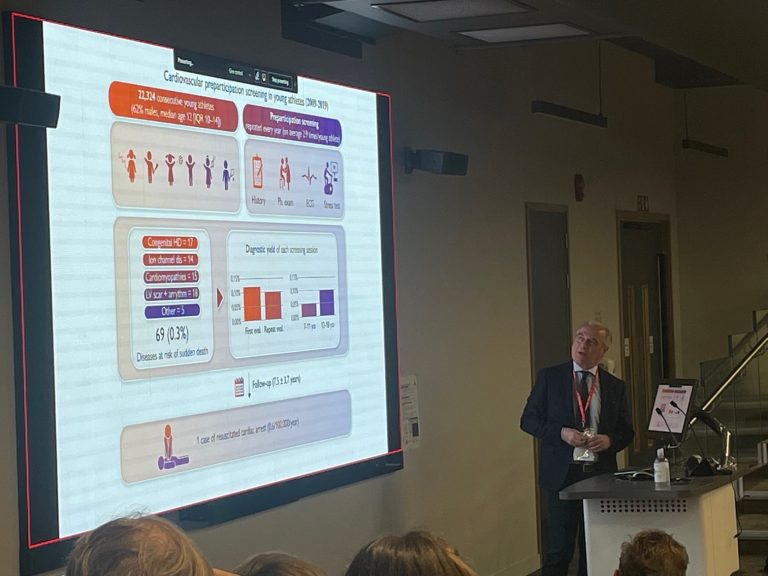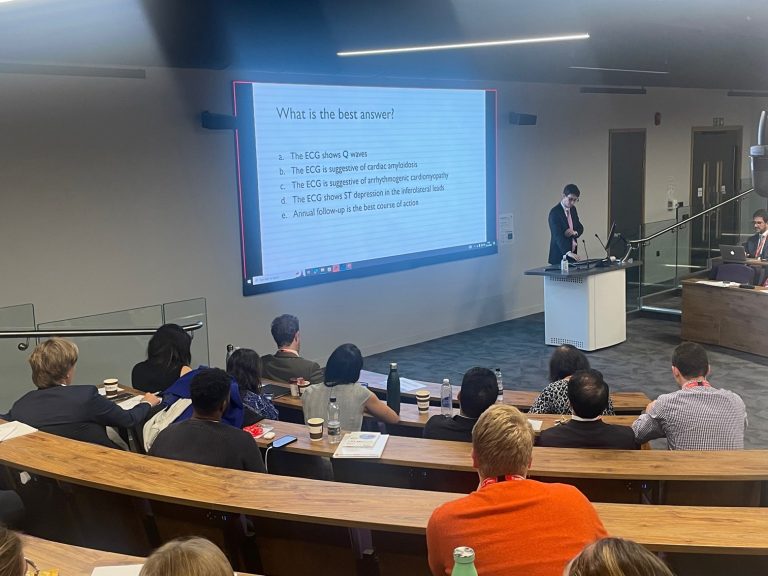
Leading researchers gather at St George's University of London, to showcase a portfolio of projects funded by Cardiac Risk in the Young
Friday October 20th saw the welcome return of CRY’s Annual Medical Conference to an ‘in person’ event (following three years of remote access) – with a new venue for 2023, The Curve Lecture Theatre at the heart of St George’s, University of London, fittingly the home of CRY’s internationally acclaimed research programme and the CRY Centre of Cardiac Pathology (CCCP).
Spearheaded and expertly organised by renowned cardiologist, Professor Michael Papadakis (who has worked closely and committedly with CRY for well over a decade and is currently also President of the European Association of Preventive Cardiology), the programme included 12 presentations from specially selected speakers on a range of subject areas, profiling exciting and thought-provoking research findings, all with the potential to inform and challenge the way young sudden cardiac death (YSCD) is approached and understood across a global research community.
Indeed, following introductions from Professor Michael Papadakis and ‘Guest Chair’, Professor Bernard Prendergast (representing the conference sponsors, Cleveland Clinic, London), the programme appropriately began with an opening talk by Professor Mary Sheppard, updating delegates with news and progress from the CRY CCP, reflecting ongoing and improved understanding of the causes of sudden cardiac death in young people.
The day was divided into four sessions with the first two [Update on Cardiac Screening and Distinguishing physiology from pathology and managing athletes with disease] comprising a packed agenda of ‘back to back’ presentations, delivered by a truly impressive ‘line up’ of leading consultant cardiologists, researchers, registrars and pathologists.
Throughout the morning, subject areas included issues as diverse as ‘safe levels of exercise for people diagnosed with HCM’, to ‘new frontiers in cardiac pathology’ and ‘understanding when medics should be concerned about athletes with ventricular arrhythmias’.
The afternoon was then split into two, interactive Case Sessions, both delving deep into the arena of Sports Cardiology, specifically exploring “Catch 22s in Cardiomyopathies and Structural Disease”. Delivered by an esteemed panel of Chairs [Professors Sanjay Sharma, Eljah Behr, Michael Papadakis, Aneil Malhotra, Dr Maite Tome, Dr Gherardo Finoccharrio], the debate and ensuing Q&As were interesting and intense, acknowledging the fact that the very ‘best of the best’ had all come together at CRY’s annual conference to share knowledge and learn from their peers.
Notably, also joining this panel of experts was Professor Domenico Corrado (a revered and familiar face at the event), who is currently Director of Inherited Arrhythmogenic Cardiomyopathies and Sports Cardiology at the University of Padua Medical School, Italy. It was a welcome return to CRY’s Medical Conference and, as in all previous years, Professor Corrado used his platform and captive audience to reiterate the widely referenced “Italian data” (showing that since mandatory cardiac screening was introduced for all those involved in ‘organised’ sport, the death rates have fallen by a staggering 89%). Earlier in the day, as part of his own presenting segment, Professor Corrado had talked through this data as part of a discussion exploring the key question of whether ‘one off cardiac screening is ever enough?’.
So, whilst the conference provided an opportunity to revisit some seminal and well established research, the event was also a chance to ‘tease’ new and potentially ground-breaking papers. For example, a study led by former Research Fellow Dr Raghav Bhatia, investigating the importance of accurate representation of the incidence and underlying causes of YSCD, focusing on a specific 9-year period, within an incredible 20-year cohort of unique, CRY-data.
The presentation, entitled, “Sudden cardiac death in the young; what does the ONS say?” was a huge talking point (both during the conference and over lunch!) with an undisputed level of anticipation among delegates for the publication of this paper, due out early next year.
Speaking after the conference, CRY’s CEO, Dr Steven Cox, commented; “It was so good to be back ‘where it all started’ and we’re hugely grateful to all our friends and colleagues at St George’s, University of London, for their help in making this happen. It was a brilliant turn out, from both the 100 or so delegates who attended in person and all those who joined us online, and I felt really proud that we were able to gather such a phenomenal panel of experts, bringing together decades of experience from the forefront of research, all with a common goal of improving the prevention of young sudden cardiac death.
“In just one day, we were able to cover a wealth of important issues from cardiac screening, progress in pathology, improved understanding of ‘safe’ levels of activity for those with a diagnosed condition and important implications and considerations for athletes.”
“The conference also underlined why research will always be at the core of CRY’s work and of our ongoing mission to reduce sudden deaths from cardiac conditions in young people. It also reminds us how important it is to keep our ‘CRY families’, supporters and stakeholders updated with our research outcomes.”
“I’d therefore like to thank each and every one of our speakers who ensured that our programme was original, current, engaging and informative. I’d particularly like to thank the Cleveland Clinic for its generous sponsorship, without which, none of this would have been possible, as well as ‘loaning’ us its Chair of Cardiology, Prof Bernard Prendergast, who did an excellent job of chairing the first session of the day.”
“I really do encourage our supporters and stakeholders to view the individual video clips of the presentations here.”
So, following such an inspiring day, full of innovation, insight and above all, hope, it feels appropriate that the final word should go to CRY’s Consultant Cardiologist, Professor Sanjay Sharma, who has championed CRY’s Medical Conference since its inception in 2006.
“What today has shown us is that CRY is continuing to sow the seeds of the next generation of specially-trained cardiologists, through its Research Fellow programme. The fact that so many previous Fellows were here, back at St George’s, presenting their incredible research findings (having taken up clinical roles in hospitals across the UK) is testament to the success of this important initiative.”
Thank you to our speakers:
- Dr Joyee Basu
- Professor Elijah Behr
- Dr Raghav Bhatia
- Professor Domenico Corrado
- Dr Gherardo Finocchiaro
- Professor Aneil Malhotra
- Dr Sarandeep Marwaha
- Professor Michael Papadakis
- Professor Bernard Predergast
- Professor Hanne Kruuse Rasmusen
- Professor Sanjay Sharma
- Professor Mary Sheppard
- Professor Maite Tome
- Dr Joseph Westaby







